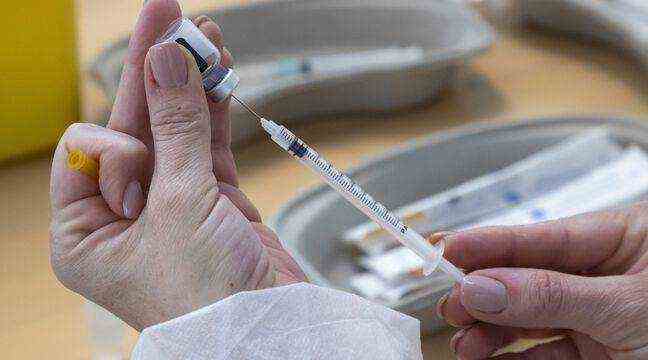Covid-19 vaccine (illustration). – SYSPEO / SIPA
- Vaccines against Covid-19 would cause retinal venous occlusions in some people, according to some Internet users.
- They are based, as proof, on a “vigilance alert” from the French Society of Ophthalmology dated May 20, 2021.
- If this document is authentic, it simply calls on professionals to keep in mind these possible cases, the very limited number of which does not indicate any causal link, at this stage, with the vaccination.
In recent days, on Twitter, a number of Internet users opposed to the vaccination against Covid-19 have been relaying the same press release to warn of an alleged unknown danger. “ OFFICIAL DOCUMENT – “The French Society of Ophthalmology has been called upon by the ANSM [l’Agence nationale de sécurité du médicament] on the occurrence of retinal venous occlusions in the days / weeks after vaccination “”, thus affirms a tweet, accompanied by the document in question.
🔴OFFICIAL DOCUMENT – “The French Society of Ophthalmology was questioned by the ANSM on the occurrence of retinal venous occlusions in the days / weeks after vaccination against Covid-19” – MAY 20, 2021 (thank you @nadine_bebec)
📢 ⚡️⚡️⚡️@ ADv_in21 @ComploTisss pic.twitter.com/PbhByV7qsW– JDLM (@ NicolasPichot6) May 30, 2021
In this “vigilance alert on the occurrence of venous occlusions following vaccination against [le] Covid-19 “dated May 20, the French Society of Ophthalmology (SFO), whose logo appears on the header, would recommend” to report to the pharmacovigilance device cases of retinal venous occlusion occurring within 4 weeks following vaccination ”when they meet two specific medical criteria.
In this context, the document – while clearly specifying that “to date, the number of cases identified seems however far from exceeding the expected prevalence of retinal venous occlusions in the population” – calls for these reports to be made to the regional centers of pharmacovigilance or “in the register of atypical thromboses [de l’ANSM] coordinated by Professor Charlotte Cordonnier ”.
FAKE OFF
This release is genuine, as confirmed at 20 minutes Professor Marie-Noëlle Delyfer, Vice-President of the French Ophthalmology Society: “We have issued this alert to vigilance intended for ophthalmologists because certain cases of venous occlusion – a very common condition in people over 60 years of age – have been reported among the elderly population vaccinated against Covid-19. “
On the other hand, the document is misinterpreted as proof of a causal link between the anti-Covid-19 vaccination and these cases of venous occlusion. “To date, there are only 8 cases among the vaccinated population, while we should expect to count around a hundred in this population. We have not received any report since the alert was issued ten days ago. Today, there is therefore no declared increased risk or any element making it possible to establish a link with the vaccination against Covid-19 ”, specifies the vice-president of the SFO.
“The alert, which emanates from a thoughtful, balanced and joint request with the ANSM, precisely aims to call on professionals to be vigilant if ever other cases were observed”, concludes Marie-Noëlle Delyfer.
Only 8 cases without history
“To date, to my knowledge, there is no case of retinal venous occlusion with formal causality [avec la vaccination contre le Covid-19] brought back to France, ”abounds Professor Charlotte Cordonnier. And to recall that “all the arterial or venous thrombotic events occurring in the month following the antiCovid vaccination, with or without a causal link”, are collected by the Temporary Scientific Committee of the ANSM on atypical thrombosis – observed for example in a few people vaccinated with AstraZeneca.
In his last pharmacovigilance report dedicated to this vaccine, covering the period from May 7 to 20, 2021, the ANSM recorded “8 new cases of central retinal vein occlusion (CRVO), bringing the number of notified cases to 28” since the start of the vaccination campaign, “occurred in patients with a median age of 65 years [40 – 87 ans], 16 women and 12 men, with a median delay compared to the vaccine injection of 7.5 days [1 – 56 jours]. “
“Cardiovascular risk factors are found for all except 8 patients for whom no history is reported,” continued the ANSM, before concluding that “the data collected over this follow-up period does not provide any new information on these effects ”and that they“ will continue to be the subject of special monitoring ”.

